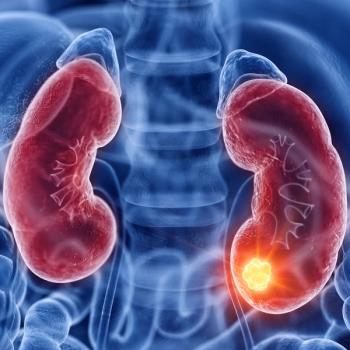
Nivolumab plus ipilimumab and chemotherapy also appears to produce a higher overall response rate compared with chemotherapy alone among those with squamous non–small cell lung cancer in the phase 3 CheckMate 9LA trial.

Your AI-Trained Oncology Knowledge Connection!


Nivolumab plus ipilimumab and chemotherapy also appears to produce a higher overall response rate compared with chemotherapy alone among those with squamous non–small cell lung cancer in the phase 3 CheckMate 9LA trial.

Trastuzumab deruxtecan may become a new therapy option for patients with HER2-positive tumors, according to an expert from The University of Texas MD Anderson Cancer Center.

Zotaifin plus abemaciclib and fulvestrant appears to produce no dose-limiting toxicities among patients with estrogen receptor–positive metastatic breast cancer in a phase 1/2 study.

Treatment with tovorafenib appears well tolerated among pediatric patients with low-grade glioma, according to findings from the phase 2 FIREFLY trial.

Patients who receive nivolumab plus chemotherapy for non–small cell lung cancer may experience sustained improvement in time to death or distant metastasis, according to an expert from McGill University Health Center.

Nirogacestat also appears to improve progression-free survival compared with placebo among those with desmoid tumors in the phase 3 DeFi trial.

Elacestrant also appears to produce a manageable safety profile in the treatment of patients with estrogen receptor–positive HER2-negative advanced breast cancer in the phase 3 EMERALD trial.

Rilvegostomig appears to yield no dose-limiting toxicities among patients with advanced or metastatic PD-L1–positive non–small cell lung cancer in the phase 1/2 ARTEMIDE-01 study.

Talazoparib plus enzalutamide appears to improve the objective response rate vs enzalutamide plus placebo among patients with metastatic castration-resistant prostate cancer harboring homologous recombination repair mutations in the phase 3 TALAPRO-2 study.

Data from the phase 2 DESTINY-CRC02 study support the use of trastuzumab deruxtecan at a dose of 5.4 mg/kg every 3 weeks for patients with HER2-positive metastatic colorectal cancer.

Germline and somatic BRCA1/2 alterations correlate with worse survival in patients with metastatic castration-resistant prostate cancer in the CAPTURE trial.

Health-related quality of life data support dostarlimab plus chemotherapy as a standard of care in primary advanced or recurrent endometrial cancer, according to an expert from Copenhagen University Hospital in Denmark.

GCF012F may show promising activity in relapsed and refractory multiple myeloma, according to an expert from Shanghai Chang Zheng Hospital.

In the study, 331 patients with IDH-mutated low-grade glioma were randomized to receive oral vorasidenib at 40 mg once daily or matched placebo in 28-day cycles.
![“We think that we can successfully de-escalate treatment of rectal cancer and achieve the same high cure rates [and] keep patients disease free, with less long-term toxicity and effects,” lead author Deb Schrag, MD, FASCO, MPH, said.](https://cdn.sanity.io/images/0vv8moc6/cancernetwork/852c505e728c0e9c7b27981b616ac51a65af1503-1200x800.jpg?w=350&fit=crop&auto=format)
“We think that we can successfully de-escalate treatment of rectal cancer and achieve the same high cure rates [and] keep patients disease free, with less long-term toxicity and effects,” lead author Deb Schrag, MD, FASCO, MPH, said.

Patients with folate receptor alpha (FRα)–high, platinum-resistant ovarian cancer experienced progression-free survival benefit following treatment with mirvetuximab soravtansine-gynx.

For the pooled analysis, investigators evaluated the efficacy and safety of bispecific antibody elranatamab in patients with relapsed/refractory multiple myeloma enrolled in 1 of the 4 MagnetisMM trials who received at least 1 proteasome inhibitor, 1 immunomodulatory drug, 1 anti-CD38 monoclonal antibody, and 1 BCMA-directed ADC and/or CAR T-cell therapy.

ADAURA included patients at least 18 years of age with completely resected stage IB to IIIA nonsquamous NSCLC who harbored EGFR exon 19 deletions or exon 21 L858R mutations.

SWOG S1826 is an open-label trial that enrolled patients with newly diagnosed stage III or IV classical Hodgkin lymphoma who were randomly assigned to receive either nivolumab/AVD or brentuximab vedotin/AVD.

Patients with DLL3-positive small cell lung cancer and neuroendocrine carcinoma experience early efficacy following treatment with BI 764532.

Numerous patients with heavily pretreated relapsed/refractory multiple myeloma responded following treatment with talquetamab and daratumumab.

Patients with renal cell carcinoma with variant histologies appear to benefit from treatment with a triplet regimen of cabozantinib, nivolumab, and ipilimumab.

Investigators report an increased objective response rate when linvoseltamab is given to patients with relapsed/refractory multiple myeloma.

A phase 1 trial continued to show positive responses when PHE885 was used in patients with relapsed/refractory multiple myeloma.

Results from the RESTORE study indicate that a cognitive behavioral stress management app improves symptoms of anxiety and depression.

Dostarlimab produces a survival benefit vs placebo in combination with standard of care therapy regardless of whether patients had mismatch repair deficient/microsatellite instability-high disease.

Results from a phase 1/2a trial show that efficacy was maintained when BNT211 was used with or without a CLDN6-encoding mRNA vaccine for patients with relapsed/refractory advanced solid tumors.

Results from the phase 1b RedirecTT-1 study show acceptable efficacy and safety when teclistamab plus talquetamab was given to patients with relapsed/refractory multiple myeloma.

According to an expert from Johns Hopkins Sidney Kimmel Comprehensive Cancer Center, radium-223 shows positive efficacy and safety findings for patients with metastatic castration-resistant prostate cancer.

The combination is also associated with a manageable toxicity profile in the second and subsequent treatment lines for patients with advanced renal cell carcinoma.